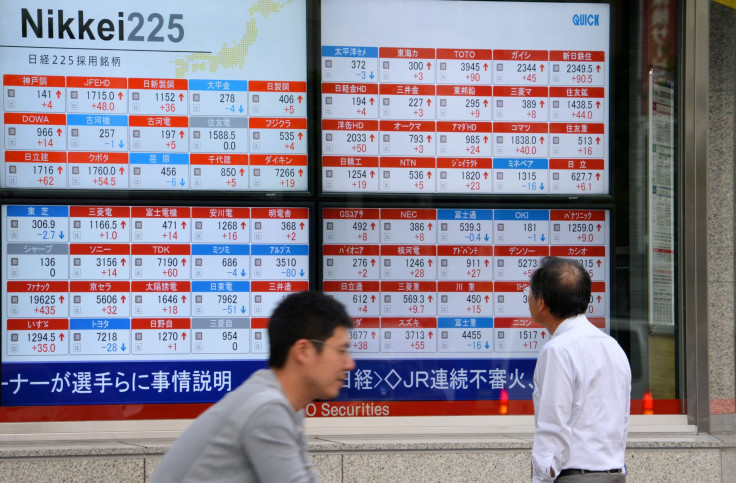Asian Shares Extend Losses After China Prices Cool

By Lisa Twaronite
TOKYO (Reuters) -- Asian shares tottered on Wednesday, extending losses after consumer inflation in Chinaeased more than expected and heightened concerns about deflationary pressures in the world's second-largest economy.
China's consumer price index (CPI) rose 1.6 percent in September from a year earlier, the National Bureau of Statistics(NBS) said, falling short of expectations of 1.8 percent and down from August's 2.0 percent.
"Given the lackluster growth outlook, we continue to expect moderate fiscal stimulus from the central government and continued monetary easing," said economists at Nomura.
Earlier on Wednesday, the Monetary Authority of Singapore said that it will ease its monetary policy for the second time this year by slowing the pace of the Singapore dollar's appreciation. The move was aimed at reviving an economy that narrowly avoided a recession in the third quarter.
MSCI's broadest index of Asia-Pacific shares outside Japan was down 0.8 percent, while Japan's Nikkei stock index shed 1.8 percent.
Chinese shares were also lower, with the blue-chip CSI300 index and the Shanghai Composite Index both down 0.6 percent.
Australian shares also extended losses after the China price figures, with the S&P/ASX 200 index down 0.5 percent, reflecting China's importance as Australia's main trading partner.
On Wall Street on Tuesday, stocks dropped, with the S&P 500 touching a fresh seven-week high before ending solidly down. S&P 500 e-mini futures slipped about 0.2 percent in Asian trading.
Stocks have been underpinned in recent weeks after the U.S. Federal Reserve held off on raising interest rates last month for the first time since 2006. But a main reason for the Fed's hesitation continued to worry investors, as U.S. policymakers fretted that a global economic slowdown might threaten the U.S. economic outlook.
The U.S. central bank will hold just two more policy meetings in 2015, on Oct. 27-28 and Dec 15-16, with expectations fading that the Fed will deliver a hike this year. [FED/DIARY]
The yield on benchmark 10-year Treasuries slipped to 2.038 percent in Asian trading from the U.S. close of 2.055 percent on Tuesday.
Crude oil prices steadied but remained under pressure after the International Energy Agency rekindled fears that the market would remain over-supplied for at least another year despite falls in output from non-OPEC producers.
"We are still in oversupply," said Daniel Ang, an investment analyst at Phillip Futures Pte Ltd.
Brent was nearly flat at $49.25 per barrel, after skidding 1.24 percent in the previous session, while U.S. crude edged up about 0.1 percent to $46.70 per barrel after losing 0.9 percent overnight.
A weaker dollar did not give much help to commodity prices.
The dollar index, which tracks the greenback against a basket of six peers, was down about 0.1 percent on Wednesday at 94.662, after falling as low as 94.539 on Tuesday, its lowest since Sept 18.
The dollar was about 0.2 percent lower against the yen at 119.54 yen, while the euro added about 0.2 percent to buy $1.1394 after rising to a 3 1/2-week high of $1.1411 overnight.
(Additional reporting by Meeyoung Cho in Seoul, and Xiaoyi Shao and Nicholas Heath in Beijing; Editing by Eric Meijer)
© Copyright Thomson Reuters 2024. All rights reserved.





















